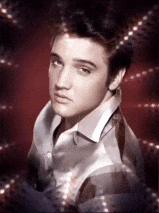
Another weird moment from that Summer we were dumped off at Grandma’s while my parents were on vacation in Canada. Elvis Presley, the guy who ushered in the Rock n’ Roll Era, influenced millions, irritated even more parents and was nicknamed the King…had died at the early age of 42. When I was a kid in 1977, 42 seemed pretty old because I was nine. I recently turned 54 so obviously 42 is young, especially with how much human life expectancy has improved!
Elvis’ death didn’t signify much to me until years later, like many Gen Xers and all how followed. At the time, he was some guy whose records you could buy via TV commercials, I only heard his songs when Dad had the radio set to WMAQ, maybe WGN and five of his 31 movies would run for a week every year on Channel 3’s Early Show; oddly, the first time I noticed, they aired Change of Habit, co-starring Mary Tyler Moore. Elvis had not become the lazy and overused punchline to the general public yet. Looking back, I’m confident he was to many in the pre-Internet Music Industry.
This Summer, the overrated Aussie director Luhrman who also did a terrible version of The Great Gatsby, made another movie about Elvis. From the trailers, it seems this take is through his greedy, short-sighted long-time manager, “Colonel” Tom Parker played by the beloved Tom Hanks. Plus it was shot in the Land Down Under for tax breaks so I would boycott it for inaccuracy and the movie industry’s insatiable avarice. Obviously, Luhrman made another flop. Despite CV-19 being normalized (for better or worse), the masses just aren’t going to the theaters to see every turd churned out. The other factor is how Elvis is fading away from the general public’s collective consciousness. He died when half of Gen X were little kids or not even born. This sadly makes him less known the Mills and Gen Z, again outside the jokes about…
- He’s not really dead, people see him constantly in odd locations or he went into the Witness Protection Program to get away from the Mafia.
- His diet and overeating.
- His wardrobe during the last third of his life.
- Graceland.
- How cheesey his movies were.
- His pill-taking and gun-collecting habits.
- How out of touch with reality he became in his final years.
As it is with all human beings, Elvis was more complicated and so were his circumstances. I could blather on about him for many things but on the anniversary of his passing, I’ll be brief for a change. Elvis will be most remembered for being a transitional figure in how the business of Pop Stars worked. To me, he’s the last major one to dominate by the old division of labor or assembly line model which was how it was for several decades. Elvis is merely the singer/face. Behind him were a cadre of professional musicians who record with him, there’s another set who tour, there’s a songwriting team to keep the flow of new hits, there’s a catalog of standards to fill up albums and so on. His music and appearance (both based upon what was popular with the Black Americans he grew up with in Memphis) were different, yet the system’s process was no different in how Frank Sinatra, Peggy Lee or others made a living.
The shift kicks in while Elvis was in the US Army and foolishly making movies when he should’ve been sticking to music to stay relevant. My advice may not have worked out, Pop Stars come and go, the masses are fickle. However, I’m pretty confident, his absence from the main spotlight gave others the opening they needed, primarily the rise of artists who did as much as they can themselves. The ones who receive the credit is usually The Beatles. Right or wrong, I admit to them being the vanguard to this shift which carries on in a form of snobbery. Many music fans, myself included, look down upon Britney Spears, boy bands and Taylor Swift because they don’t write their own songs, or in the case of Taylor and aging crone, Madonna; they always need a ghost writer as Elvis did, to get the sweet publishing rights money. Today, both Pop Star techniques co-exist, just not with the same fan bases. The earlier model continues to be aimed at the younger crowds via The Monkees, Sean Cassidy, New Kids on the Block, Miley Cyrus, etc. It also skews toward pre-teen girls, thus branding it training-bra music. The “latter” model is what many graduate to as they become teenagers or young adults, and they find the stuff they are really into. To be fair, this model did exist before the Beatles, it was just a harder sell to those in power since they owned the rights to the standards everybody had to cover. Other times, there’s an overlap: Beatles, Duran Duran, Paramore and Billie Eilish. Usually begins by accident but marketing dregs hijack things to sell more records, which is what’s all about anyway.
So, to circle back. Elvis, the King, died 45 years ago and according to my hypothesis, he was the last Pop Star with the greatest, broadest appeal via the factory model. Although, he continues to be a punchline, it too will fade and confuse newer generations like all the dated Looney Tunes references to Eddie Cantor and Mae West.
